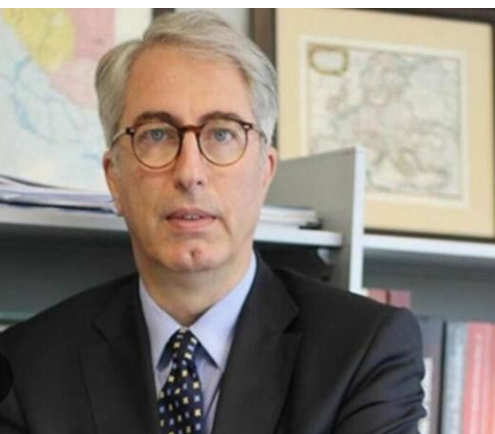The rapprochement and establishment of strategic political and economic relations between Türkiye and Iraq appear to be of a nature that will alter not only the Middle East equation but potentially the equation in a broader region as well.
The recent intensification of Türkiye-Iraq contacts in the security domain is not coincidental. From Türkiye’s perspective, the presence of the PKK in Iraqi territories and, from Iraq’s perspective, the presence of Türkiye in Iraqi territories due to the PKK, are among the most crucial issues hindering a broader agreement. The most challenging issue is mutual security and trust. Once this relationship is established, the rapprochement between Türkiye and Iraq can be reflected in agreements during Erdogan’s meetings with Iraqi President Abdul Latif Rashid and Prime Minister Mohammed Shia al-Sudani.
Türkiye-Iraq security traffic
One of the factors that led to the recent intensification of Turkiye-Iraq contacts is the ongoing “Claw” series of operations of Turkish Armed Forces (TSK) against the PKK in Iraqi territories since May 2019.
The PKK attacks that resulted in the martyrdom of 21 soldiers in December and January in the Clow-Lock (Pençe-Kilit) operation region in Northern Iraq had implications related to Türkiye’s efforts to block Sweden’s NATO membership approval in the Turkish parliament. But they also had connections to the visit of a high-level security delegation from Iraq to Ankara on December 19, just before these attacks.
The visit initially announced as Iraqi Foreign Minister Fuad Hussein’s visit to his Turkish counterpart. But when Fuat Hussein arrived accompanied by Defence Minister Sabah al-Jassim and officials from the intelligence service, Turkish Defence Minister Yaşar Güler and National Intelligence Organization (MİT) Chief İbrahim Kalın went to the Foreign Ministry and attended the meeting.
The visit by the high-level security delegation comprising Fidan, Akar, and Kalın to Baghdad yesterday was a continuation of Iraq’s government’s message during the Ankara visit, which essentially meant “Okay, let’s solve this issue together.”
Syria and US dimension
In addition to the security dimension, the visits of Güler and Kalın to Iraq (including Erbil) and the visits of Iraqi National Security Advisor Qasim al-Araji to Ankara have been notable during this process. President of the Kurdistan Regional Government (KRG) Nechirvan Barzani met with Minister of National Defense Güler during the Antalya Diplomacy Forum.
The meeting held by Fidan and Kalın with Güler before the recent Baghdad visit was particularly significant as they had just returned from high-level talks in the United States. Both Fidan and Kalın emphasized the fight against the PKK during their talks in the US. In fact, during Fidan’s meeting with US Secretary of State Antony Blinken, the American side decided for the first time to discuss the Syrian issue and “revitalize cooperation in counterterrorism”.
The strategic dimension of Türkiye-Iraq relations encompasses not only counterterrorism but also other aspects such as energy and transportation. The Development Road Project which will connect the Persian Gulf to Türkiye via road and rail lines as well as reopening of the two oil pipelines carrying Mosul and Kirkuk oil to Adana’s Ceyhan-Yumurtalık terminal are on agenda. But security is considered as the prerequisite for these.
Security, energy, transportation, water
The inability to operate the oil pipelines due to security concerns deprives both the central Iraqi government and the Kurdistan Regional Government of significant revenue.
For Iraq, the waters of the Euphrates and Tigris are crucial. The Euphrates flows from Syria into Iraq and joins the Tigris, ultimately flows into the Persian Gulf from Basra. A comprehensive agreement could also pave the way for a new water regime between Türkiye and Iraq.
The Development Road Project is a highway and railway transportation project that starts from Persian Gulf, traverses Iraq from south to north, and reaches the Turkish border. With the reinforcement of pipelines in the future, it could offer an alternative route to Red Sea-Suez route to transport Gulf oil to Europe. It also provides a new route for those, from China, India to Japan who want to transport their other products, not just oil, to Europe and the Caucasus via Türkiye and Iraq. This interest extends particularly to Iraq and the Gulf countries. Hence, the United Arab Emirates and Qatar are also interested investors in the project.
Such developments could potentially change the Middle East equation currently trapped in the conflict between Israel and Iran.
However, all these initiatives hinge upon ensuring security.
Türkiye-Iraq security cooperation?
Security, for Türkiye, means combatting the PKK, while for Iraq, it means countering ISIS (ISIL) and Al-Qaeda attacks. In fact, ISIS members preparing for an attack on the Iraqi Embassy in Ankara were apprehended through a joint operation by the Turkish Ministry of Interior and the National Intelligence Organization.
When combined with recent developments, the meeting of Turkish and Iraqi generals on Iraqi soil, President Tayyip Erdoğan’s mention of a 30-40 kilometer security corridor within Iraqi territory, and Minister of National Defense Güler’s statement that the Claw-Lock operations would be completed this year, present a different picture. This implies that such a security corridor could be established with Türkiye-Iraq military and intelligence cooperation. One implication of this is that Iraq could assert its sovereignty over the Iraqi territories it currently cannot effectively control, and joint security operations against the PKK could be launched when necessary.
Excerpt only, click the link to read the entire article
Follow our English language YouTube videos @ REAL TURKEY: https://www.youtube.com/channel/UCKpFJB4GFiNkhmpVZQ_d9Rg
And content at Twitter: @AtillaEng
Facebook: Real Turkey Channel: https://www.facebook.com/realturkeychannel/
